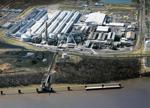News
USA - Southeast Missouri aluminum smelter curtailment poses challenges for local economy, national industry
Tweet
The recent closure of the Magnitude 7 Metals aluminum smelter in the small town of Marston in southeast Missouri has created uncertainty for both the local region and the U.S. aluminum industry.
The plant, formerly owned by Noranda Aluminum, first opened in 2018. The plant employed more than 400 workers before its sudden curtailment in January.

The recent closure of Magnitude 7 Metals smelter in Marston leaves the small town without a major employer. | Via Magnitude 7 Metals/LinkedIn
Employees were notified on Jan. 24 that within four days, they would no longer be needed at the plant. In a note provided to workers, management cited “abnormally cold weather” that impacted operations to a point that couldn’t be repaired while the plant was open. Magnitude 7 Metals did not respond to requests for comment.
The smelter’s plight has caught the attention of state officials. Sen. Josh Hawley wrote to President Joe Biden in January urging him to invoke the Defense Production Act. House minority leader Crystal Quade, who is running for governor, also introduced legislation that would allow large scale customers like the smelter to access other renewable energy providers.
The lack of advance notice of the closure has also drawn concerns about violations of Missouri’s WARN Act, which requires employers to give advance notice to employees before mass layoffs. However, the act does make exceptions in cases of natural disasters, completion of project or business circumstances that were not reasonably foreseeable.
The smelter was a sizable employer for the region and one of five smelters left nationally. With an uncertain future ahead of it, its curtailment has left locals, lawmakers and industry experts wondering what comes next.
'A double whammy'
Employees and local economic leaders had heard whispers of the plant’s potential closure through the end of 2023, but the speed of its curtailment came as a surprise to many.
“Whenever we hear those types of rumors, it does raise a red flag,” said Marcie Lawson, president of the Sikeston Area Economic Development Corporation. “We focus on seeing where other jobs and training opportunities could be for these employees, if and when that happens.”
However, the timing of the closure has been a challenge for the region. In October 2023, a Tyson Food poultry processing plant closed in Dexter, a town roughly 41 miles from Marston. The plant provided over 650 jobs.
“It’s a double whammy after losing the Tyson plant,” Lawson said. “I’ve talked with other large employers in the area who took in those Tyson employees after they were displaced, and they said they might not have the same capacity for these Magnitude 7 employees.”
With limited opportunities in the area, former Magnitude 7 employees are now left in a lurch to find new employment. Some were able to pick up jobs driving trucks as they possessed commercial driver’s licenses, employees said, but many still faced uncertain futures.
“That was the only real opportunity, especially if you were not a college graduate, or had some specialized skill,” said James Owen, the executive director of Renew Missouri.
Renew Missouri works to advance renewable energy and energy efficiency in Missouri. The organization had been working with the smelter to find cheaper, renewable energy alternatives to its current coal plant, as electricity accounts for about 40% of the cost of the aluminum industry, Owen said.
“That was about as good of a job as you would get anywhere,” Owen said. “There's been a bomb that's hit this area as far as job loss.”
Industry in ‘deep crisis’
The aluminum smelter’s curtailment has posed issues on the national level as well. The plant produced approximately 20% of the country’s domestic capacity.
Magnitude 7’s story is a repeated one. It is the third smelter in as many years to have been curtailed, closed or idled. Its curtailment poses a warning to the remaining four smelters in Indiana, Kentucky, New York and South Carolina.
Losing a fifth of domestic aluminum production practically overnight was “frustrating to watch” said Annie Sartor, the aluminum campaign director for Industrious Labs, an advocacy organization that works to decarbonize the industrial sector and had been working with Magnitude 7 to find renewable sources of energy.
“This is an industry that's in such a deep crisis,” Sartor said. “There's four facilities left. I think the takeaway for them is that they have to decarbonize or they're gonna go under, too.”
Decarbonization has become an important conversation in the aluminum industry. The process aims to reduce or eliminate the amount of carbon dioxide and other greenhouse gasses emitted into the atmosphere. In the aluminum industry, as much as 60% of the emissions produced when making primary aluminum comes from electricity usage.
Compared to other materials, aluminum can have a lower carbon footprint. This is part of its appeal, said Chuck Johnson, president of the Aluminum Association, a trade group that represents aluminum companies and their suppliers.

Chuck Johnson, president of the Aluminum Association. | Courtesy of Chuck Johnson
“More and more, the reason that people are using aluminum is to decarbonize end products,” Johnson said. “If you're going to decarbonize end products, you can't source high carbon material solutions for those products.”
Keeping carbon emissions low allows North American aluminum to remain competitive in the global market — which is expected to grow to $255 billion by 2030.
“For instance, in Canada, they source all of their electricity from hydroelectric dams,” Johnson said. “It takes no carbon to run a hydroelectric dam. And so with that green energy, you can flip the scales and you can decarbonize so much of your process by 60%, it brings you down below some of your competing materials.”
Aluminum is also important in the broader transition to renewable energy sources, as it is a component for parts such as solar panels, electric vehicle batteries and turbines. However, the current projections of how much aluminum is needed for those transitions requires more than what the country currently produces, Sartor said.
In addition, the curtailment of the Magnitude 7 smelter will affect technology, infrastructure and defense sectors, Owen said. This means an increased reliance on imported aluminum.
“If we don't have that domestically-sourced aluminum, we're gonna be getting it from China,” Owen said. “We're going to be getting it from the (United Arab Emirates), we're going to be getting it from Qatar. That to me, that poses international concerns. That if we are wanting to build up our national grid, if we're wanting to build up our defense, we should not be relying outside of our borders for that necessarily.”
Paths forward
Currently, the smelter’s future is uncertain. While the options aren’t “turn-key fixes,” Lawson said the possibilities are there for the smelter to reopen.
“I think it would really take some work at the corporate level, to make sure that they've got a great business plan, the cash flow, everything that they would need to make sure that they have a sustainable business model that will keep those jobs for more than just two, three, four years,” Lawson said. “We really want to have a smelter that's going to be here for a lifetime.”
It's possible the company could find a new buyer for the smelter, Sartor said. Magnitude 7 bought the plant from Noranda Aluminum, so a similar situation could occur.
Strong market demand is also there, Johnson said, which is a positive sign for the smelter.
“This smelter has to have a robust market…If the demand isn't there, if demand is not growing, or if demand is stagnating or contracting, then you have to ask yourself, ‘What are you fighting for?’” Johnson said. “But the fact is that it is there.”
Sartor said she would also like to see measures taken to decarbonize the smelter be a priority if the plant were to reopen.
“There's a lot of tools right now," Sartor said. "The Inflation Reduction Act passed almost two years ago now. The Bipartisan Infrastructure Law has a lot of incentives. So operators need to be availing themselves of those investments to set themselves on a path to decarbonization and help find some of that renewable energy.”
Regardless of the path forward, officials are hopeful that the smelter will reopen due to its economic impact at both the local and national level.
“I want to see this plant reopen," Owen said. "I want to see it run cleaner. I want to see it run in a better way. I want to see it run in a more economic way. I want to see people in southeast Missouri have a job."
Source: missouribusinessalert.com
Tweet
Related News
- Stay Ahead in Nonferrous and Lightweight. Follow Diecasting & Nonferrous China 2026
- European Foundry Industry in Transition – New Opportunities Through the Defense Sector
- Global pig iron production fell by 4.4% y/y in October
- India sharply increased iron ore imports by more than 200% y/y in January-October
- EU plans to limit exports of aluminium scrap
- Calderys Group celebrates 160 years of innovation and industrial excellence
- Foundries in Transition: Why Humanoid Robots Are Now in Demand
- Iron ore exports from Brazil increased by 5.7% y/y in January-October
- See all News
